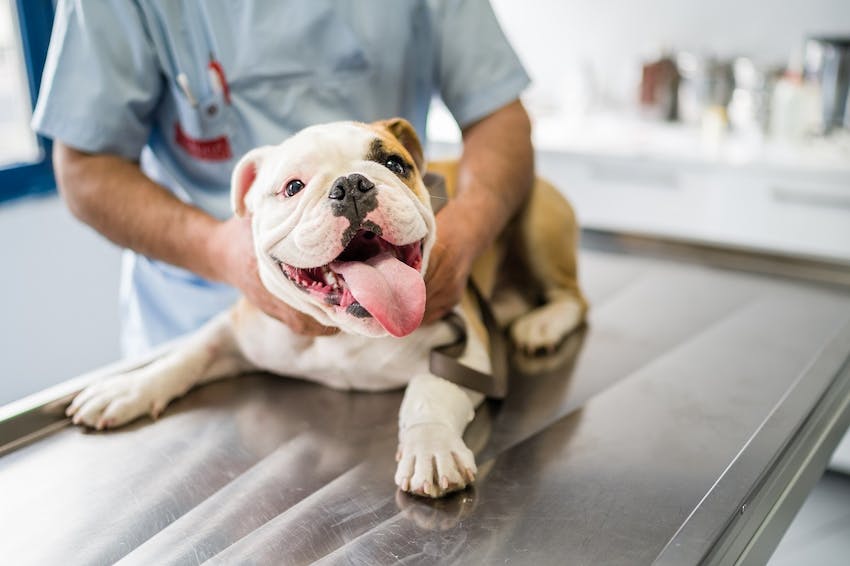Ready to help treat your pet to a healthy life?
Can Dogs Get Colds? Understanding Canine Respiratory Infections
By : Kelli Rascoe & Trupanion Staff | Updated Nov 21, 2024

You may notice your dog congested from time to time, but can dogs catch the common cold like humans do?
The sniffles can affect your dog at any time. From a seasonal change, traveling, or a cold winter snap, your furry family member can become sick with respiratory illnesses like their human counterparts. While dogs don't catch colds in the exact same way that we do, they can experience similar symptoms when infected with certain viruses or bacteria.
Even so, it's worth noting that the signs we often associate with seasonal colds can be indicative of more serious health issues in canines. If your dog is making repeated coughing sounds, for example, give your veterinarian a call right away. In the meantime, let's explore the common respiratory infections that can affect dogs, their symptoms, and what you can do to help your furry friend.
How do dogs catch colds?
Your dog or puppy’s immune system may respond differently to their home, a new environment, or an interaction with another pet. According to Trupanion veterinarian Dr. Caroline Wilde, colds to a human often mean something different for your pup.
“Colds in humans are caused by an adenovirus," Wilde explains. "Adenovirus in dogs does not cause respiratory signs, so while dogs don’t really get ‘colds’, they can get contagious respiratory infections, which are more often bacterial, as is the case with kennel cough.”
So, can dogs get colds? The verdict is yes, just maybe not in the same way you might get a cold. Instead, what you recognize as a "cold" in your pet is more likely a different type of upper respiratory infection.
Causes of canine colds
There are a variety of more serious respiratory infections that can result in cold-like symptoms in dogs, from the flu (canine influenza) to distemper and Bordetella bronchiseptica (a common bacterial cause of kennel cough).
Likewise, physical damage to the lungs or respiratory tract as well as certain invasive diseases and even nasal parasites can also mimic cold symptoms. Allergies are also notorious for causing respiratory issues that are similar to those of the common cold. If you have a brachycephalic dog (like a pug), you'll likewise want to become familiar with breed-related health conditions that can mimic canine colds, but are rooted instead in physiology.
Regardless of what you think the cause of your dog's illness may be, it's important to leave diagnosis to the professionals. Have your pet evaluated by a veterinarian to rule out more serious health conditions and get your pal's wellbeing back on track.

Signs of a cold in dogs
Depending on the severity, spotting dog colds can be tough. Nevertheless, any change in your dog's behavior or overall appearance may be cause for concern.
Wilde points out some common signs of an upper respiratory infection / canine cold to look for in your best friend:
- Discharge from the eyes
- Nasal discharge
- Cough
- Sneezing
- Lethargy
- Loss of appetite
Despite these common signs of dog colds, it's important to realize that your pet may not always show all the signs of any illness. Whether you notice they are suffering certain symptoms or simply feel something is off, it's important to seek the medical care of your veterinarian promptly.
Treatment options
Always consult with your pet’s veterinarian, both to determine the severity of your pet's illness as well as whether or not it's a canine cold in the first place.
“Your pet may need antibiotics or even an x-ray to rule out pneumonia,” says Wilde. "Your dog’s treatment plan may also vary depending on the severity of the diagnosis."
If your dog shows signs of a respiratory infection, it's crucial to consult with a veterinarian promptly. The vet may recommend supportive care, such as rest, proper nutrition, and hydration. In some cases, antibiotics may be prescribed for bacterial infections.
How long do dog colds last?
How long your pet is sick will depend on the exact cause of their illness, not to mention their age and general state of health. An older dog with some ongoing health conditions suffering from a respiratory infection may take a longer time to recover than a young adult dog with a strong immune system, for example. Nevertheless, if your dog is not feeling better within five to ten days, give your veterinarian call — it may be time for a reevaluation and a different treatment approach.

Preventing colds in dogs
Preventing respiratory infections in dogs involves a combination of vaccination and proper hygiene, as well as avoiding exposure to infected animals. While there are no vaccines available for the common dog cold due to it having a wide variety of causes, vaccines are available for some of the common viruses that cause respiratory infections in dogs, including the canine influenza virus and Bordetella bronchiseptica.
Whether you’re staying at home or traveling with your furry friends, here are some tips worth following to help keep your pets happy and healthy:
- Follow your veterinarian’s vaccination guidelines to avoid preventable respiratory tract infections.
- Make sure any boarding or daycare facility has up-to-date vaccinations for all your pets.
- Avoid contact with any dogs that are exhibiting respiratory signs.
- Keep your pets at home if they’re feeling sick.
- Be mindful in public spaces, like at the dog park, groomers, or veterinary clinic.
- Keep your pet company with extra attention, cuddles, and love.
- Protect your pet with a good dog insurance plan — you can't predict when or where they'll get sick, but having pet insurance ahead of time will help ensure they can get the best treatment available for their condition.
Keep in mind that canine cold usually stems from a viral illness, which means it is contagious and spread easily among dogs. So, keep your pet home if they’re feeling sick, and be mindful of shared toys, bowls, and pet spaces both in and out of the home.
Can all dogs catch colds?
A respiratory illness can affect dogs of all sizes, breeds, and ages. But by observing your pet, talking with your veterinarian, and sticking to your pet’s treatment plan, your pet will be ready to get out and adventure in no time at all!
Canine colds can occur any time of year, but they can be particularly common during the colder months. Make sure you're protecting your pet from cold weather properly.
